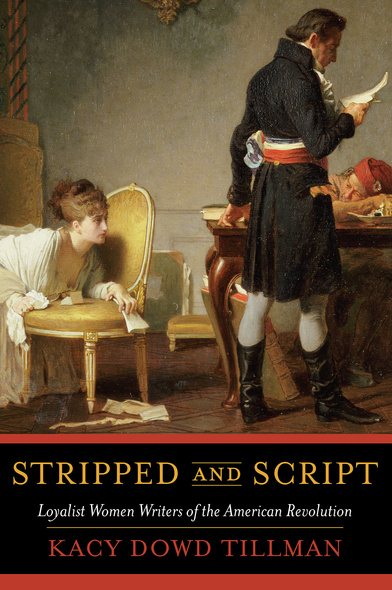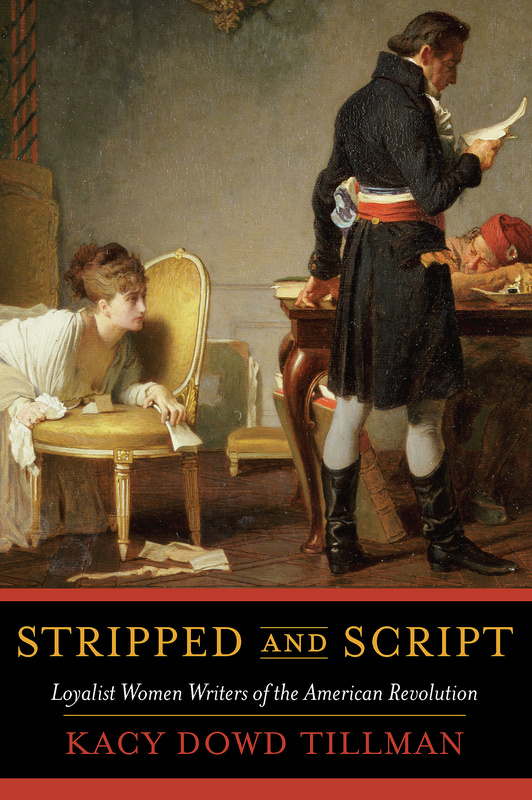Stripped and Script
Loyalist Women Writers of the American Revolution
University of Massachusetts Press
Female loyalists occupied a nearly impossible position during the American Revolution. Unlike their male counterparts, loyalist women were effectively silenced—unable to officially align themselves with either side or avoid being persecuted for their family ties. In this book, Kacy Dowd Tillman argues that women's letters and journals are the key to recovering these voices, as these private writings were used as vehicles for public engagement. Through a literary analysis of extensive correspondence by statesmen's wives, Quakers, merchants, and spies, Stripped and Script offers a new definition of loyalism that accounts for disaffection, pacifism, neutralism, and loyalism-by-association. Taking up the rhetoric of violation and rape, this archive repeatedly references the real threats rebels posed to female bodies, property, friendships, and families. Through writing, these women defended themselves against violation, in part, by writing about their personal experiences while knowing that the documents themselves may be confiscated, used against them, and circulated.
'Stripped and Script breaks new ground by introducing a framework for interpreting a collection of worthwhile authors and texts that demonstrate the variety and vitality of manuscript writing in the eighteenth century.'—Desirée Henderson, author of Grief and Genre in American Literature, 1790–1870
'Stripped and Script makes a significant contribution to the fields of early American literature, personal writings, women's history, and Revolutionary War history. Tillman closely examines a trove of archival material, giving it coherence by looking at it through the lens of rhetorical performance in the context of the Revolutionary War.'—Karen A. Weyler, author of Empowering Words: Outsiders and Authorship in Early America
'Tillman's deft and sympathetic readings foreground the women's fascinating individual stories. In illuminating the political perspicacity and generic ingenuity of these women, Tillman's book reminds one of how easily the voices of dissent can be obscured in the push to craft a unifying national story'—CHOICE
'Tillman skillfully walks the reader through the steps of her analysis—a tactic that will be particularly rewarding for scholars who have spent more time with historical rather than literary scholarship . . . Stripped and Script's biggest contribution is in the realm of methodology. By successfully using an approach that places literary analysis at the center, Tillman demonstrates the value of closely studying rhetoric.'—The Junto
'Most readers of Stripped and Script will come away impressed with its large archival footprint. More impressive, though, is how Tillman's monograph presents the unfolding of the American 'Crisis' before it had been codified into the episteme of the 'American Revolution.''—Legacy
'Based on extensive archival research, particularly in the Pennsylvania area, Stripped and Script capably depicts [the] ways gender molded how subjects perceived sources of authority and the threats around them, as well as the ways in which their womanhood allowed them to work in ways men could not. The book also includes a fascinating description of the physical realities of letter-transport in wartime, and the important role women had as conveyers of information across enemy lines.'—Pennsylvania History
'The book's strengths lie in [Tillman's] approach to the sources, her willingness to archive-dive, and in her nuanced approach to the complications of women's lives in the eighteenth century . . . Her evocative writing makes her work a pleasure to read.'—New England Quarterly
‘Tillman’s study is lively and engaging partly because she puts herself and her search of the homes of loyalist women at the beginning of every chapter, where, time and again, she encounters erasure of or revision to loyalist legacies . . . Tillman smartly keeps a tight focus on the (mostly) manuscript genres in which her subjects wrote rather than generalizing beyond them, and, as she cogently argues, loyalist women could access the public sphere of print only with great difficulty.’—American Literary History
‘Stripped and Script provides a clear and well-written analysis of loyalist women’s intimate manuscript writing and its larger implications. Its tantalizing details inspire readers to seek out additional examples of women’s engagement with letter-journals and other forms of singular and collective life writing.’—Alisa Wade, H-War
KACY DOWD TILLMAN is associate professor of English at the University of Tampa.





